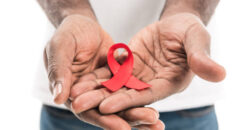
Your body is amazing, isn’t it?
Of course, that doesn’t mean things can’t go wrong fast, and in some cases, they do. Heck, in some cases, we don’t know what hit us! This is where knowing your body is so critical, especially if you’re a Black person living with HIV/AIDS.
Despite making up only 13 percent of the population, Black folks account for roughly 42 percent of new HIV diagnoses. Moreover, Black HIV/AIDS patients suffer more complications and poorer health outcomes compared to other races.
The good news is, that there are several crucial biometrics – measures of your body processes – that can steer you right. If you’re managing your HIV/AIDS, here are four aspects of your health you absolutely need to keep an eye on…
1. CD4 Cell Count
CD4 cells are what we call T-helper cells. Basically, they play a major role in your immune system’s defense against infections. Now, as you may know, HIV targets and destroys these cells, which then of course makes you more vulnerable to infections. This is why monitoring your CD4 cell count is crucial. If your count gets too low, that’s where antiretroviral therapy (ART) may be necessary.
On the flip side, an increasing count indicates your body is responding positively to treatment and/or remaining ‘immunologically’ strong. Regularly monitoring your CD4 cell count is essential for preventing major issues. It also gives you the knowledge and power to make decisions along the way. Talk with your healthcare team about any changes in your count.
Whether it’s good news or bad news, any news is important to staying on top of your game!
RELATED: Your Guide to HIV Medications
2. Complete Blood Count (CBC)
The CBC is more or less a comprehensive blood test that covers all the bases. From red blood cells to white blood cells and platelets, it tells you everything you need to know about your blood’s most important components. In individuals with HIV/AIDS, CBC monitoring is absolutely vital (as in, your life could depend on it!).
See, people with HIV/AIDS are often susceptible to problems such as anemia, leukopenia, and thrombocytopenia, all of which can stem from either the disease itself or treatments. With anemia, you don’t have enough red blood cells. With leukopenia, you’re lacking white blood cells, which makes you vulnerable to sickness. And with thrombocytopenia, you need more platelets, which can lead to excessive bleeding issues.
Fortunately, by doing regular CBC monitoring, you can foresee these problems before they happen, and avoid all the painful and potentially life-threatening issues that come with ’em!
3. Viral Load
This biometric is a little different than the previous ones because it measures HIV’s presence more specifically. Basically, viral load refers to the amount of HIV RNA in your blood. It’s a good way to know how/if HIV is replicating and the disease is progressing. Monitoring viral load also helps your doctor determine if antiretroviral therapy (ART) is effective.
By checking it early, your healthcare provider can tell if you’re drug-resistant or if your treatment is failing. Black HIV patients ideally want to maintain an undetectable viral load (<50 copies/mL). This is the best level for long-term health and reduced transmission risks. More detectable viral loads may range from high to low, with as many as millions of copies/mL.
With a proactive approach and regular testing, you can avoid these high detectable levels and all the severe health outcomes that coincide.
4. Kidney Function
Problems from HIV/AIDS affecting your kidneys are commonly called HIV-associated nephropathy (HIVAN). Nephropathy just means anything that impairs your kidney function and can be anything from an acute or long-lasting disease or damage. For Black folks living with HIV, HIVAN sometimes leads to end-stage renal disease if not addressed. Fortunately, monitoring kidney function is pretty routine.
Tests such as serum creatinine, estimated glomerular filtration rate (eGFR), and urinalysis are all great ways to check your kidney function. These regular tests can detect any underlying issues early so that you don’t progress to end-stage problems. Not sure if you need to talk to your doctor yet? Signs of kidney dysfunction usually appear as swelling in extremities, irregular urination, high blood pressure, bone pain, nausea and vomiting, and itching.
For individuals with HIV, it’s all about being proactive and being open in communication. After all, what’s worse than hearing ‘bad’ news – hearing it and doing something about it, or not hearing it and letting the problem progress until there’s nothing that can be done?
The good news is, that by checking the four biometrics regularly, you can take charge of your condition. A collaborative effort between patients and healthcare providers makes a world of difference.









